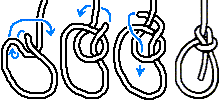| The Bowline |
| If
the task isn't critical, and you need to thread the loop around or
through something before closing the loop, you can use the
Bowline. If the job needs a truly secure end loop, try the Water Bowline or a Zeppelin Loop if a hitch isn't appropriate. The Bowline isn't generally bad, but it isn't secure enough for critical applications, especially where the line will see a lot of movement and/or where stiff or slippery rope is used. If you tie a Bowline in polypropylene rope, and give it a few shakes, you’ll quickly discover its lack of security. If you're going to use it, please don't tie it the landlubber's way! Learn to form the signature Bowline half hitch part by twisting the end of the line over, under and upward around the standing part, in one quick motion. You’ll need to know this before moving on to the Water Bowline. Not only is this a quicker method, it also greatly reduces the odds of you tying the knot incorrectly. RUNNING LOOPS Like any loop, the bowline can be made into what is known as a running loop shown below, which causes the loop to act as the sliding part of a noose. This can be done in three different ways. You can tie the loop around the standing part of the rope, or you can run the other end of the rope through the loop and pull until you get the running loop down to size, or lastly, you can pull a bight of rope from the standing part of the rope through the loop, and then carefully work the torsion out of the original loop. Running Bowline  |
| _______________________________________________________________________ You can make a dog leash by using a running bowline in concert with a figure 8 stopper knot to keep the running bowline from running too far and choking your dog. Of course, the fixed bowline must be made very small to prevent the figure 8 stopper knot from sliding through. |
 |